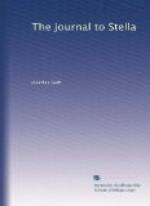5 Elizabeth Villiers, eldest daughter of Sir Edward
Villiers, Knight Marischal
of England, and sister of the first Earl of Jersey.
In 1695 she married Lord
George Hamilton (son of Lord William Douglas, afterwards
Duke of Hamilton),
who was raised to the peerage of Scotland in 1696
as Earl of Orkney. William
iii. gave her an Irish estate worth 26,000 pounds
a year. Swift’s opinion of
her wisdom is confirmed by Lord Lansdowne, who speaks,
in his Progress of
Poetry, of
“Villiers, for
wisdom and deep judgment famed,
Of a high race,
victorious beauty brings
To grace our Courts,
and captivate our Kings.”
The “beauty” seems a poetic licence; Swift
says the lady squinted “like a
dragon.”
6 Cliefden.
7 See Letter 12, note 7.
8 Swift’s sister (see Letter 9, note 22).
9 Forster reads “returned.”
10 See Swift’s letter to General Hill of Aug. 12, 1712
11 Swift’s housekeeper at Laracor.
12 I.e., be made freemen of the City.
Letter 53.
1 Addressed to “Mrs. Dingley,” etc. Endorsed “Octr. 18. At Portraune.”
2 “Sometimes, when better company was not to be had, he [Swift] was honoured by being invited to play at cards with his patron; and on such occasions Sir William was so generous as to give his antagonist a little silver to begin with” (Macaulay, History of England, chap. xix.).
3 The History of the Works of the Learned, a quarto periodical, was published from 1699 to 1711.
4 See Letter 35, note 4.
5 See Letter 28, note 25.
6 Lady Elizabeth Savage, daughter of Richard, fourth Earl Rivers (see Letter 11, note 9), was the second wife of James Barry, fourth Earl of Barrymore. Of Earl Rivers’ illegitimate children, one, Bessy, married (1) Frederick Nassau, third Earl of Rochford, and (2) a clergyman named Carter; while another, Richard Savage, was the poet. Earl Rivers’ successor, John Savage, the fifth Earl, was a Roman Catholic priest, the grandson of John, first Earl Rivers. On his death in 1728 the title became extinct.
7 No. 32.
8 Very sick.
9 From “but I” to “agreeable” is partially obliterated.
10 Mrs. Swanton was the eldest daughter of Willoughby Swift, and therefore Swift’s second cousin. In her will Esther Johnson left to Swift “a bond of thirty pounds, due to me by Dr. Russell, in trust for the use of Mrs. Honoria Swanton.”
11 This sentence is partially obliterated.
12 See Letter 51, note 2.
13 See Letter 5, note 16.
14 The latter half of this sentence is partially obliterated.
15 Partly obliterated.
16 See Letter 8, note 2.
17 Wise.
18 Partly obliterated.
19 See Letter 6, note 45.




